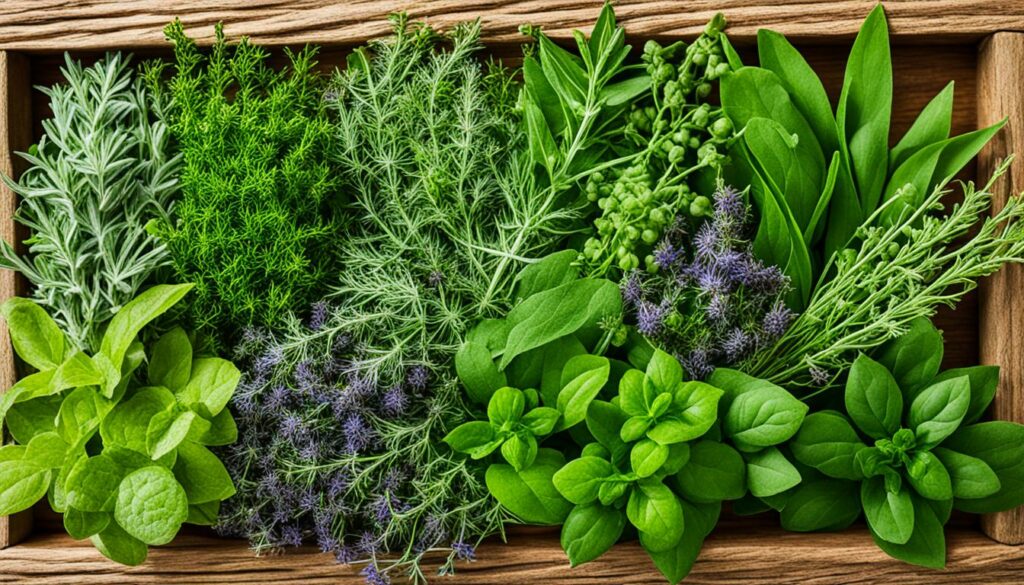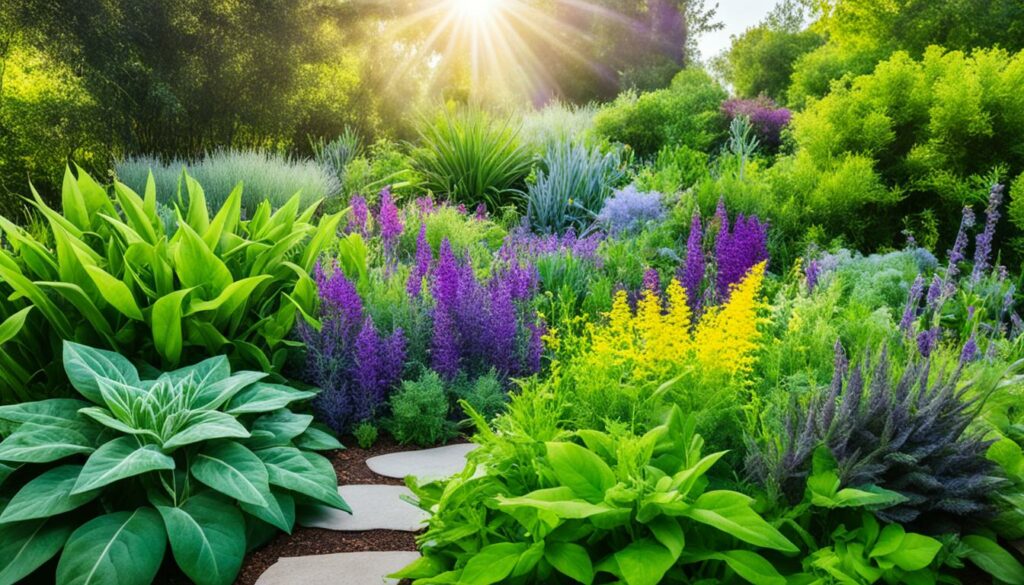Did you know turmeric, a spice in your kitchen, has been used for over 4,000 years in Ayurvedic practices? This shows how natural anti-aging herbs keep us young and full of life.
Today, we’re surrounded by many beauty products. But, let’s look at what nature offers. Herbs like ginseng and turmeric are great for the skin and overall health. Using these herbs can make us appreciate traditional remedies more. They help our bodies and improve our health and looks.
When searching for herbal wellness, it’s important to know about different herbs. Ginseng boosts energy, and turmeric fights inflammation. There’s a lot to learn that can help you stay young and full of life.
Key Takeaways
- Turmeric has been a key component in Ayurvedic practices for centuries, known for its anti-inflammatory benefits.
- Ginseng is recognized in traditional Chinese medicine for its ability to rejuvenate both body and mind.
- Effective herbal solutions can help mitigate the effects of aging caused by environmental factors and oxidative stress.
- Embracing natural remedies supports not just your skin’s health but overall bodily wellness.
- Regular incorporation of these herbs into your routine can enhance vitality and prolong youthfulness.
Understanding the Causes of Aging
Aging is a complex process with many factors at play. It’s key to know what causes aging to understand how to stay healthy and live longer.
Cellular Aging
Cellular aging means cells get less effective over time. This affects your health and looks. Cells that age can’t regenerate as well, causing wrinkles and less elastic skin. Keeping cells healthy is key to fighting aging.
Influence of Genetics and Heredity
Genetics greatly affect how you age. Your genes can show how your skin and health might change with age. Knowing your genes helps you make choices to slow aging.
Environmental Factors and Pollutants
Things like pollution and UV rays speed up aging. These can harm skin cells. Protecting yourself from these dangers is important for your skin and health. Eating foods rich in polyphenols can also help fight aging. Learn more about their benefits here.
Role of Free Radicals and Oxidative Stress
Free radicals are unstable molecules that cause oxidative stress. This stress damages cells, speeding up aging. Antioxidants fight this damage, and using anti-aging herbs can help too.
Lifestyle Impacts on Aging
What you do every day affects aging. Eating right, staying active, and managing stress are key. Eating foods full of antioxidants can reduce inflammation and stress, keeping you looking young and healthy. Adding foods with polyphenols can boost your fight against aging.
| Factor | Impact on Aging |
|---|---|
| Cellular Aging | Decline in cellular function leads to visible aging signs. |
| Genetics | Predisposition to age-related diseases. |
| Environmental Pollutants | Accelerate skin damage and aging. |
| Oxidative Stress | Causative factor of cellular damage. |
| Lifestyle Choices | Impact health, stress levels, and inflammation. |
What Are Anti-Aging Herbs?
Anti-aging herbs are plants known for helping you look and feel younger. They offer a natural way to fight aging signs with fewer side effects than traditional treatments. These herbs are packed with antioxidants, vitamins, and minerals that fight oxidative stress and keep your skin healthy.
Definition and Importance
“Anti-aging herbs” are plants that help slow down aging. Herbs like Ashwagandha and Turmeric do more than just improve skin. They boost brain function and increase energy levels. Adding these herbs to your daily routine can make your skin look more youthful and hydrated.
How They Differ from Modern Treatments
Anti-aging herbs are different from modern medicines because they are natural. They work with your body to balance it out. Herbs like Ginseng and Amla target oxidative stress and inflammation to improve health, not just looks.
Historical Use in Various Cultures
For centuries, different cultures have valued anti-aging herbs. In Ayurvedic medicine, herbs like Gotu Kola and Holy Basil are seen as rejuvenating. Traditional Chinese Medicine has also used these herbs for their health benefits.

Learning about these traditional uses can help you use anti-aging herbs in your health routine. Adding specific herbs to your daily life can improve your skin and overall health. For more tips on fighting oxidative stress with food, check this informative resource.
Top Anti-Aging Herbs for Youthful Vitality
Using certain herbs can help you stay young and full of life. Here are some top anti-aging herbs that fight aging signs and boost your health.
Turmeric: The Golden Spice
Turmeric is known as the golden spice for its anti-inflammatory and antioxidant powers. Curcumin, found in turmeric, is key for skin health. It calms irritation and keeps skin elastic, making it a top choice for anti-aging.
Green Tea: A Powerful Antioxidant
Green tea is packed with catechins that shield the skin from UV damage and aid in healthy aging. It’s full of antioxidants that reduce fine lines, keep skin moist, and boost collagen. This makes green tea a top pick for anti-aging.
Ginseng: The Vitality Herb
Ginseng is famous for its energy-boosting and skin renewal effects. It’s loaded with antioxidants that fight free radicals and brighten your skin. Its adaptogenic traits help keep you healthy, making ginseng a key anti-aging herb.
Ashwagandha: Stress Relief and Longevity
Ashwagandha is known for reducing stress and supporting longevity. Chronic stress speeds up aging, but this herb balances and clears your mind. It creates a healthy aging environment, boosting your overall well-being.
Ginkgo Biloba: Enhancing Circulation
Ginkgo biloba is great for improving circulation. It feeds skin cells with essential nutrients, enhancing skin tone and texture. As a top herbal remedy, ginkgo biloba fights age-related skin problems.

How to Incorporate Anti-Aging Herbs into Your Routine
Adding herbs to your daily life can keep you looking young and full of energy. You can use dietary herbs, supplements, or skincare products for this. Here are easy ways to add these powerful herbs to your life.
Including Herbs in Your Diet
You can easily add herbs to your meals for more flavor and health benefits. Here are some ideas:
- Turmeric: Add turmeric powder to soups, smoothies, or rice dishes for its anti-inflammatory effects.
- Green tea: Brew green tea as a refreshing drink, packed with antioxidants.
- Amla: Include amla powder in juices or yogurt to boost collagen production.
Using Herbal Supplements
For stronger benefits, try herbal supplements. They come in capsules, powders, and extracts. Make sure to choose high-quality ones. Here are some popular options:
- Ashwagandha: Helps the body manage stress, contributing to a youthful appearance.
- Ginseng: Known for increasing vitality and overall energy levels.
- Licorice Root: Offers a multitude of plant compounds beneficial for skin health.
Topical Applications for Skincare
Add herbs to your skincare routine with homemade masks or serums. These can make your skin look great. Here are some ideas:
- Calendula cream: Soothes irritated skin and promotes healing.
- Aloe Vera gel: Hydrates and reduces the appearance of wrinkles.
- Neem oil: Calms redness and inflammation, combatting free radical damage.
The natural skincare market was worth 6.7 billion dollars in 2021. This shows people are really into holistic beauty. Using these methods can help you look younger and healthier.
| Herb | Key Benefits | Usage |
|---|---|---|
| Turmeric | Anti-inflammatory, antioxidant | Meals, supplements, topical |
| Aloe Vera | Hydrates, promotes collagen | Skincare gels, topical |
| Ginseng | Increases energy, enhances vitality | Supplements, teas |
| Ashwagandha | Reduces stress, promotes longevity | Supplements, powders |
| Calendula | Supports healing, hydrates | creams, topical |
Conclusion
Adding anti-aging herbs to your daily routine is a great way to stay young and full of life. This article has shown how these natural remedies can help. They improve skin elasticity and protect against harmful stress.
Herbs like turmeric, ginseng, and rosemary are backed by science. They help with aging and keep you healthy. Ginseng boosts collagen, and turmeric shields your skin from the sun.
By learning about these herbs, you can improve your skincare and health. This leads to looking and feeling younger from the inside out.
Getting advice from health experts is key, especially if you have health issues. Using herbal remedies can make you look and feel better. For more tips on natural wellness, check out this article on boosting libido and.
FAQ
What are the benefits of using anti-aging herbs?
Anti-aging herbs boost skin health, fight inflammation, and protect against damage. They help you look younger and feel better overall.
How does turmeric contribute to skin health?
Turmeric has curcumin, which fights inflammation and protects against aging. It makes the skin look smoother and younger.
Can green tea really protect against UV damage?
Yes, green tea has catechins that shield the skin from UV rays. This helps prevent early signs of aging.
What role does ginseng play in maintaining youthful vitality?
Ginseng boosts energy and fights aging with its antioxidants. It keeps the skin looking young and healthy.
How can ashwagandha help with aging?
Ashwagandha reduces stress, which slows down aging. It helps you stay young and healthy from the inside out.
What is the significance of ginkgo biloba in skincare?
Ginkgo biloba improves blood flow to skin cells. This means better skin health and a more vibrant look.
How can I incorporate these herbs into my daily routine?
Add turmeric to your meals, drink green tea, or take herbal supplements. Using face masks with these herbs can also help.
Are there any side effects to using anti-aging herbs?
Anti-aging herbs are generally safe. But, talk to a doctor before starting any new herbal routine.




